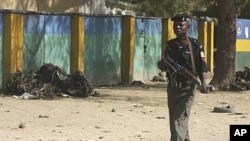Police in Nigeria's second largest city, Kano, are keeping a low profile after Islamic militants struck their offices and killed many of their colleagues in a series of daring bomb attacks. The official death toll from Friday's attacks stands at 185, but news agencies suggest it could be much higher. Abuja reports the attacks revealed glaring weaknesses in Kano's security setup.
Days after the radical Islamic sect Boko Haram staged a coordinated series of attacks in Kano, its citizens are struggling to understand how the city's security failed so badly.
The picture beginning to emerge is one of hundreds of Boko Haram fighters acting with military precision, simultaneously storming police stations and other government buildings. The attacks began after Friday prayers in the ancient Muslim commercial center.
Reporter Salisu Fage of the Leadership newspaper in Kano says the ease with which the attackers overwhelmed the police has left many citizens feeling defenseless.
"Certainly everybody is surprised at the kind of sophistication they have because even the police couldn't have the weapons that can fight back," said Fage. "People are wondering from where and how they are getting their weapons and the kind of training they are having."
Police officials have been conspicuously silent since the attacks, declining interview requests and keeping cell phones switched off.
Yunus Zakaria Ya'u of Kano's Center for Information Technology and Development says officers who normally wear uniforms have switched to plain clothes to avoid notice by the unseen enemy.
"There is less visibility of police on the streets, I guess it is largely strategic," said Ya'u. "They probably are using plain clothes since the uniform has become the target of the Boko Haram. "
Reporter Salisu Fage says the city's 8,300 strong police force is insufficient to provide security for 14 million residents. He says Friday's failure has sent morale among officers to a new low.
"The police have been devastated by the series of attacks," added Fage. "It affected their psychology, affected their morale, and it must have a serious impact on their ability to come up with a satisfactory explanation."
In the days since the attacks, several unexploded bombs have been found around Kano, fueling suspicions that more attacks may be imminent. A few loud explosions heard Tuesday raised fears that the killings and destruction may have been continuing. But no new attacks were reported.
Boko Haram is a shadowy radical Islamic group dedicated to establishing an Islamic state in mostly Muslim northern Nigeria. In the Hausa language spoken in the north, the name means “Western education is sacrilegious." Sympathizers say the name is a rallying cry against the perceived corruption of Nigeria's western-educated elites.
Human Rights Watch issued a statement Tuesday calling the recent series of high-profile Boko Haram bombings “an indefensible attack on human life." The rights group said 935 people have been killed since Boko Haram began its campaign of violence in July 2009, including more than 250 in the first three weeks of this year.
In recent months, the group has claimed responsibility for a suicide bomb at the United Nations offices in the capital, and for a Christmas Day blast that killed more than 40 people at a Catholic church near Abuja
Nigeria Police Investigating Kano Attacks















